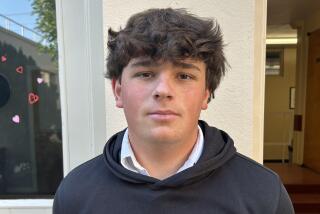Air Force Refusal to Fly Dying Worker Home Upsets Kin
- Share via
The family of an Air Force employee dying of cancer is angry with the Department of Defense for refusing to fly the man by air ambulance from Palmdale to Boston so he can spend his last days in the suburb where he grew up.
Avram Brody, 25, a civilian who worked as an electronics engineer at Edwards Air Force Base for three years, was diagnosed with an inoperable brain tumor last year, officials said. Doctors in July gave him only weeks to live.
Family members say his final wish is to return to his childhood home of Norwood, Mass. But the cost of providing commercial air ambulance service for the trip is between $5,000 and $10,000, a sum the family cannot afford, said Margaret Sullivan, an assistant to Rep. Nicholas Mavroules (D-Mass.).
Despite requests over the past few days from Mavroules and Rep. Joe Moakley (D-Mass.), as well as U. S. Sen. John Kerry (D-Mass.), Air Force officials have refused to fly Brody, citing regulations that prohibit transporting civilians. If Brody was an enlisted man with a fatal illness, he would be eligible for a free flight, Air Force officials said.
“I understand their position, that they just can’t pick up and take anybody,” Brody’s wife Aimee told the Associated Press from the couple’s home in Palmdale. “But by the same token, he worked for them. He worked for his country, defending his country, and they’re not helping him in his time of need.”
Air Force Maj. Fran Tunstall said it would cost the government about $30,000 to provide air ambulance transportation for Brody.
Relatives of Brody began calling Massachusetts representatives last week to help persuade the Air Force to fly Brody and his wife aboard a specially equipped plane to Norwood, where Brody’s family has lived for three generations, said Tom Drummey, a legislative aide for Massachusetts state Rep. Gregory Sullivan.
“All he wants is to be back home,” Drummey said. “A hospital nearby has agreed to pay for his ambulance ride from the airport. His hospital bed is waiting, and his doctor is waiting.”
Last-minute efforts to arrange passage home aboard a commercial airline flight fell through last week when family members could not quickly raise $5,000 to pay for Brody, his wife and Brody’s mother, Drummey said.
Brody’s medical condition has since worsened, making it difficult to find a commercial airline that will agree to carry him on a cross-country flight even if the money were available, Drummey said.
Commercial airlines are reluctant to fly Brody because in his condition, a slight change in cabin pressure could be fatal, Drummey said.
“The Air Force argument is that if you do it for one person, it will open the floodgates for all kinds of civilian personnel,” said John Weinfurter, an administrative assistant to Moakley.
Firm Position
Margaret Sullivan, Mavroules’ assistant, said Air Force officials have held firm despite strong lobbying efforts by the Massachusetts representatives.
“We got a strong message, loud and clear; the Air Force wasn’t going to be pushed on this one,” Sullivan said.
Brody’s co-workers at Edwards have taken up a collection to help with expenses, said Dennis Shoffner, base spokesman. But relatives fear that time is running out for Brody, who this week slipped in and out of a coma, officials said.
“It’s just a human tragedy,” Sullivan said.
More to Read
Sign up for Essential California
The most important California stories and recommendations in your inbox every morning.
You may occasionally receive promotional content from the Los Angeles Times.








